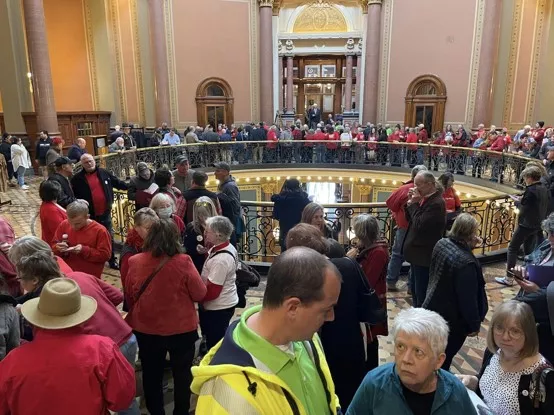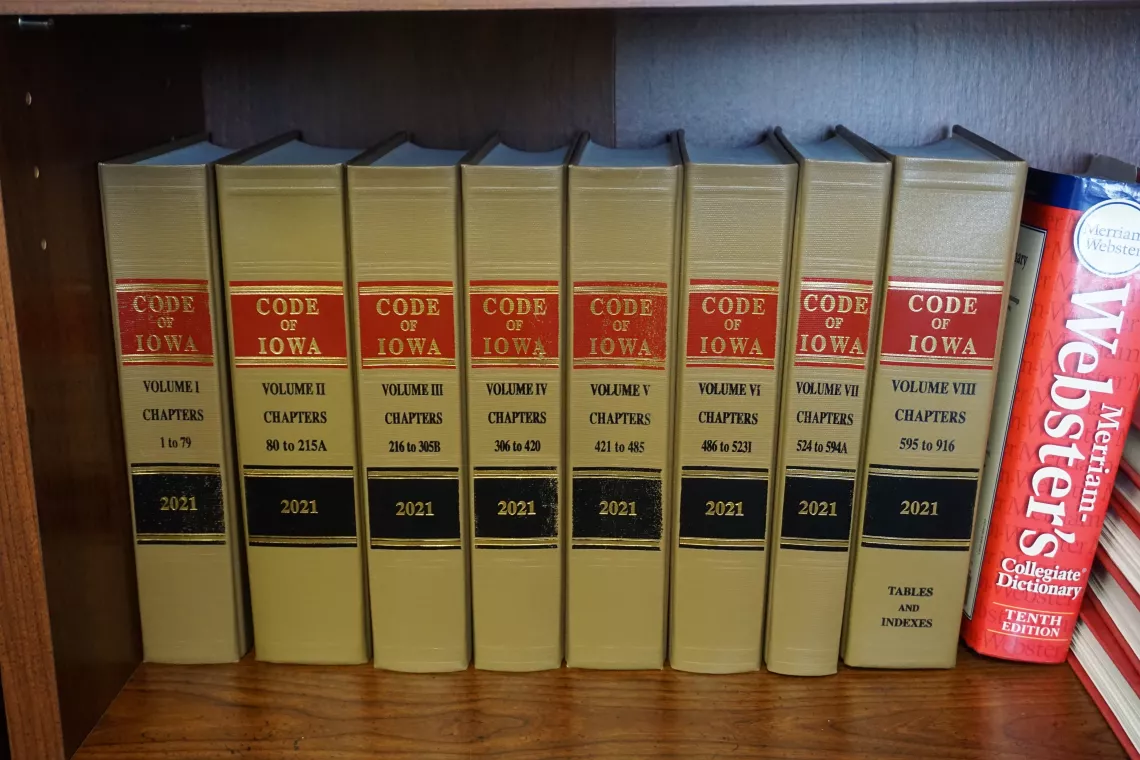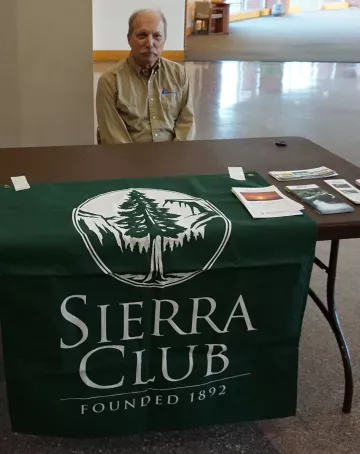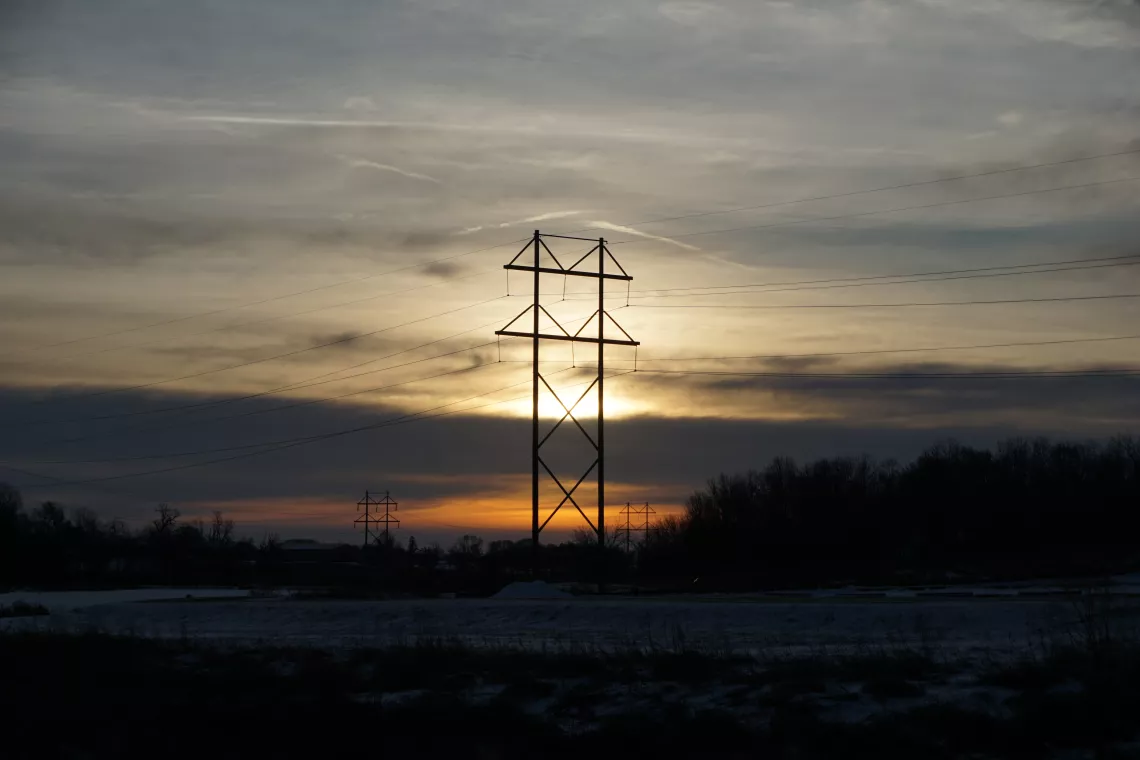We are in the midst of the legislative session. The first funnel winnowed out some of the legislation that had not progressed through the process and the second funnel at the end of March will winnow even more bills. If you have been following the session via the media, you already know huge battles over social and cultural issues have been raging for weeks. I expect those battles will continue until the final gavel falls in late April or early May.
In the meantime, we are continuing to work on environmental issues - banning eminent domain for carbon dioxide pipelines, protecting urban topsoil, black bear protection, preserving the oversight of our monopoly utility companies, and much more.
If you want to stay on top of the legislative issues we are following, visit our blog at www.sierraclub.org/iowa/blog
Take care,
Pam Mackey Taylor, Chapter Director and Newsletter Editor
What you can do to help the environment
-
Ask your state representative to support the CO2 pipeline legislation - bill HF565
-
Ask members of the House Local Government Committee to oppose legislation that overturns city and county rules on topsoil restoration at construction sites
-
Keep on top of the bills at the Iowa legislature by following our blog.
-
Donate to the Iowa Chapter of the Sierra Club so that we can continue our work.
-
Catch up on this month's lunch and learn education videos

Photo of pipeline lobby day at the Iowa Capitol, courtesy of Jessica Mazour
In this issue of the Iowa Sierran
Legislature
-
Topsoil becomes a dirty subject at the legislature
Protecting the Environment
-
Governor takes a sledge hammer to ALL rules
-
Pipeline Update: 78% of Iowans oppose the use of eminent domain
Plus
-
Join us for interesting and informative Lunch and Learns
-
Contribute to the Iowa Chapter
-
Volunteer for the Iowa Chapter
-
Calendar of events
-
To see the archive of previous Iowa Chapter newsletters
-
To see the White Pine Needle newsletter
CO2 pipeline bill coming to House Floor
A major bill has been introduced in the Iowa House that strengthens the pipeline easement requirements and landowner rights regarding pipeline construction. This pipeline bill – HF565 (formerly HF368) - was introduced by Representative Steven Holt, along with 22 co-sponsors, including House Speaker Pat Grassley.
Among its features are:
-
The IUB shall not issue a permit for a CO2 pipeline until the federal pipeline safety administration (PHMSA) provides new rules updating the safety standards for CO2 pipelines.
-
The permit is conditioned upon the pipeline company obtaining all other applicable permits, including federal and state regulatory permits, state and local highway and road crossing permits, and local zoning permits.
-
The bill requires 90% of route miles as voluntary easements before eminent domain can be used.
-
It prohibits the IUB from granting the right of eminent domain unless the company first acquires all applicable pipeline construction and zoning permits from the other states.
-
It expands damages that constitute compensable loss to include soil compaction, damage to soil or water conservation structures, and damage to irrigation or drainage systems.
There are two parts of the bill that Sierra Club would like to see changed. First, instead of using miles to determine voluntary easements, we would prefer that it use parcels. Parcels is the unit used by the Utilities Board during its processes plus the county compensation boards deal with parcels during eminent domain proceedings. Second, we prefer that the amount of land required as voluntary easements needs to be greater than 90% and would prefer that to be 98% or even a total ban on eminent domain for these projects that are benefiting private companies and are not for public use.
With that being said, we encourage you to contact your state representative and ask for their support of HF565.
To look up your house member, see www.legis.iowa.gov/legislators/house
To find your legislators, see www.legis.iowa.gov/legislators/find

Topsoil becomes a dirty subject at the legislature
The Iowa legislature is attempting to ban cities and counties from setting requirements for topsoil restoration on building sites. The bill would also force cities and counties to repeal their ordinances that have requirements for contractors and homebuilders to restore topsoil and reduce soil compaction on building sites.
Bill SF455 has already passed the Senate and is now under consideration by the House Local Government Committee. Ask the members of the House Local Government Committee to oppose SF455 - shannon.latham@legis.iowa.gov , cindy.golding@legis.iowa.gov , ako.abdul-samad@legis.iowa.gov , jerome.amosjr@legis.iowa.gov , jane.bloomingdale@legis.iowa.gov , jeff.cooling@legis.iowa.gov , ken.croken@legis.iowa.gov , tom.determann@legis.iowa.gov , dave.deyoe@legis.iowa.gov , jon.dunwell@legis.iowa.gov , ruthann.gaines@legis.iowa.gov , dan.gehlbach@legis.iowa.gov , stan.gustafson@legis.iowa.gov , robert.henderson@legis.iowa.gov , amy.nielsen@legis.iowa.gov , carter.nordman@legis.iowa.gov , anne.osmundson@legis.iowa.gov , matthew.rinker@legis.iowa.gov , art.staed@legis.iowa.gov , luana.stoltenberg@legis.iowa.gov , elizabeth.wilson@legis.iowa.gov
In 2015 the Iowa Department of Natural Resources revised its topsoil rule so that a developer or homebuilder would be allowed to decide how much topsoil to replace, if any, following construction. Previously the rule required four inches of topsoil to be returned. That led to cities and counties establishing their own topsoil requirement.
The stormwater permit (NPDES General Permit 2) that contractors must obtain does not specify the amount of topsoil that must be returned to a building site after construction. It states that the permittee "shall minimize soil compaction and, unless infeasible, preserve topsoil". Further, NPDES Permit 2 states, "'Infeasible' shall mean not technologically possible, or not economically practicable and achievable in light of the best industry practices." What it boils down to is that contractors often do not leave adequate topsoil on lots and often leave heavily compacted lots. That frustrates homeowners who are trying to grow grass, gardens, ornamental plants, and trees on their lots.
Reasons for the topsoil restoration are to help increase water infiltration into the soil, to prevent runoff and erosion, to retain healthy soil and to lessen the degradation of water quality. Topsoil retention will aid the homeowners in their efforts to establish landscaping on their lots – grass, trees and gardens.
Topsoil holds water on the land and also holds fertilizer. When the topsoil has been stripped from a lot and not returned, water runs off the land, exacerbating flood risks. To make matters worse, fertilizers do not stay in the ground, instead running into Iowa's lakes, rivers, and streams.
Homeowners across the state complain about properties where no topsoil was returned to the building site. Homeowners thought they were purchasing a lot with topsoil, only to find that the sod was laid on compacted soil with no topsoil returned. They relate horror stories about the inability to grow trees, grass, and gardens. They have painful stories about the costs that they either have incurred or were quoted to remedy the situation. It is infinitely more expensive for a homeowner to restore the topsoil than for a developer to do it in the first place. Furthermore the price of returning topsoil to a lot would be bundled into a homeowner's loan at the time of purchase. Getting that loan is easier than trying to get a separate loan to complete the work that the contractor did not perform.
So, it makes sense to allow local communities and counties to establish requirements for returning topsoil to building sites and reducing compaction of soil on the lot because there are no federal or state requirements.

Bill would tax forest reservations
Currently the Iowa Code gives a property tax exemption for woodlands (called forest reservations in the law) that are at least two acres and have not less than 200 trees per acre. There is also an exemption for fruit tree reservations.
A bill has been introduced in the Iowa Senate - SF548 (formerly SSB1129) – that would repeal the property tax exemption on forest reservations and begin assessing property taxes on the land. This bill should be opposed by our legislators.
Ask your state senator to oppose SF548.
Woodlands and forest reservations are important to Iowa’s environment.
-
Forests protect highly erodible land. Some land should not be put into row crops.
-
By protecting highly erodible land, soil is kept out of our rivers, streams, and lakes, thus improving water quality. Soil destroys fish habitat.
-
Trees help cleanse the air. Plus trees capture carbon dioxide.
-
Forests provide habitat for both non-game and game animals.
-
Trees provide beauty. They attract tourists in the fall who enjoy looking at the fall leaves.
-
There is value in the landscape for things other than crops.
-
Property tax exemptions are provided for other purposes, so it is not out of the ordinary to provide a property tax exemption for forests and fruit tree reservations.

-
Fruit and nut trees are part of the economic activity in the state.
-
The derecho damaged large numbers of trees in Iowa. We should be encouraging landowners to invest in those properties and keep them in forests and fruit tree reservations.
In a fiscal note prepared by the Legislative Services Agency (LSA), LSA estimates that this bill would increase property taxes paid on forest and fruit tree reservations to $5.3 million in fiscal year 2026. Out of that, $1.1 million would go to the public schools and would replace state money that is currently given to the public schools. Then $4.2 million of the property tax increase on forest and fruit tree reservations would go to the local taxing jurisdictions.
A landowner should be rewarded for protecting woodlands. A way to encourage the on-going protection for forested areas is to grant the landowner a property tax exemption on the forest.
Misguided I-Will Bill
Although voters have long awaited implementation of I-Will and increased funding it provides, an effort is currently underway to undercut some of the areas that I-Will was intended to fund. (Note, I-Will is also known as the Natural Resources and Outdoor Recreation Trust Fund.)
In 2010, 63 percent of Iowa voters gave overwhelming support to a constitutional amendment, referred to as I-Will, that would allow increased investment in Iowa’s parks, recreation, clean water, and agriculture soils through a three-eighth cent sales tax. All that is needed is to increase the sales tax.
Prior to the time voters agreed to the constitutional amendment, the legislature had passed a bill that indicated how the I-Will money was to be divided into various categories which would then support the new projects. The legislation was clear that this was to be new money for new projects and not shifting existing funding into the I-Will funding.
The legislature is now looking at a bill that would increase the sales tax which would trigger the funding of the I-Will projects, but it has several huge gotchas written into it. Tell your state senator to vote no on SF550 and its changes to I-Will in Division 8.
Troubling areas in the bill include:
- Currently the roads through the park are funded through the Iowa Department of Transportation. The bill would have I-Will fund the construction, maintenance, or expansion of roads.
- The bill changes the percentages allocated to the funds that were envisioned when I-Will was passed. Most significantly it reduces the money allocated to REAP which is a long-standing program in the Department of Natural Resources (DNR).
- Iowa Economic Development Authority would be involved in decisions where money is spent on recreation purposes. Furthermore, the scoring would require the money to further the economic development policy of the state. The DNR is fully capable of determining how its funds are allocated and does not require an economic development lens in making those decisions. Protecting wildlife habitat or endangered species is important and a lofty goal over economic development and is exactly what the voters intended.
- Decisions on expending funds will give a higher priority on nutrient reduction projects. At the same time there is nothing to ensure that the nutrient reduction projects will indeed reduce nutrients. Making matters worse, there is no requirement that the DNR set numerical standards for water bodies along with a reasonable date that the standards must be met. So far taxpayers have expended significant amounts of money with limited or no results in reducing nutrients in Iowa's waterbodies.
- Prioritizing nutrient reduction is a lofty goal for the Department of Agriculture. Requiring the Department of Natural Resources and Department of Transportation (for use in trails) to making reducing nutrients a top priority when they expend the I-Will funds is not appropriate.
- A higher priority is to be given to maintaining or preserving existing public lands over acquiring additional land. We do not support this, since Iowa is 47th in the nation in the percentage of the state held as public lands. Public lands are important in a state that has very little public land. The DNR lands are mostly highly erodible or floodplains which are not farmable and, thus, are not destroying opportunities for beginning farmers, as some legislators contend.
- The money allocated to the DNR for "establishment, restoration, and enhancement of state parks, state preserves, state forests, wildlife areas, wildlife habitats, native prairies, and wetlands" is being amended to include the management of those areas. The management would move the salaries and benefits of park rangers and other staff to the I-Will account. This will result in less money being available for the functions of "establishment, restoration, and enhancement" of those areas.
- The bill would terminate the increased sales tax on January 1, 2051. That clearly was not what the voters approved for the constitutional amendment, which did not include an end date for the sales tax.
These gotchas would leave less money for the things that have been designated to receive I-Will funding, including establishing, restoring, or enhancement of state parks; recreation; wildlife diversity; improvement of water trails, rivers, and streams; and education and outreach regarding natural history and the outdoors. It is a scheme to reduce the money available for those things voters expected when they voted for I-Will and its "new money", by redirecting expenditures for roads and staff to the I-Will funds. That is unacceptable. It goes against the purpose of I-Will which was to generate new money to fund new projects for the Department of Natural Resources. It goes against what the voters were led to believe when they voted on I-Will over a decade ago.

Photo by Nick Graceffa
Update on Government Restructuring
The bill that would restructure state government has passed both chambers and is on its way to the Governor’s desk. By all indications, the Governor will be signing this bill. The Governor’s office paid a consultant almost 1 million dollars to layout the restructure of government operations and functions.
The Sierra Club opposed the bill – SF514 (formerly HF662, HSB126, SSB1123). Buried within the 1600 page bill were a number of items that concerned Sierra Club, including:
-
The transfer of the State Historical Preservation Office to Economic Development. The State Historic Preservation Office identifies, preserves, and protects Iowa's historic and prehistoric resources. It administers the state and federal historic preservation programs. It also maintains a survey and inventory collection of historic properties in Iowa. SHPO comes into play when a developer wants to construct a project and an archeological survey, both historic and prehistoric, is required, including National Environmental Protection Act (NEPA) studies. The SHPO office should not be overseen by the agency that is advocating for increased economic development. That is like the fox guarding the chicken house.
-
The Office of Consumer Advocate is being reconfigured in a way that it will be subjected to the political whims of the Attorney General. The consumer advocate is responsible for representing the public interests in cases before the Iowa Utilities Board (IUB). The consumer advocate will no longer be required to be an attorney. The work before the IUB is highly technical plus it involves significant legal work. Although the Consumer Advocate has staff, it makes sense for that work to be overseen by an attorney. The consumer advocate has been responsible for hiring the attorneys, administrative, and technical staff required to fulfill its duties. That responsibility will now fall on the attorney general. This is clearly a step in politicizing the consumer advocate and removing the independence of the consumer advocate. This is troubling, when that role is expected to represent the public interests. Bear in mind, the attorney general is elected by the public and runs as a political partisan. The campaign donors and money interests will be gaining undue political influence over the consumer advocate.
-
A boards and commissions review committee is being established to study the efficiency and effectiveness of each board, council, commission, committee, or similar entity. It appears that the number of boards, commissions, committees will be significantly reduced through the review process that will be undertaken in the months after the legislation is signed. That will reduce the amount of public input in our decision-making processes. That will concentrate even more power in the governor's hands with even less oversight. The committee will submit a report containing its findings and recommendations to the governor and the general assembly by September 30, 2023. That is a relatively short period of time to do this work.
-
The attorney general will be granted exclusive jurisdiction to prosecute election-related crimes. Generally that role has been filled by the county attorney. There is no reason for that role to change. These will clearly be politically-motivated prosecutions.

Governor takes a sledge hammer to ALL rules
Earlier this year, the governor signed an executive order that would require the agencies and departments of the state government to repeal all rules.
Laws are passed by the Iowa legislature. The agencies and departments write rules that fill in how the laws are going to be administered and carried out by the state agency. Also rules lay out how the state agencies and departments will administer and implement federal laws, such as the Clean Air Act and the Clean Water Act.
As part of the governor’s order to repeal all rules, each department and agency is to undertake an extensive cost-benefit analysis that would determine if the rule should then be replaced. According to the executive order, the only way a rule can be replaced is if the new rule reduced overall regulatory burden or remained neutral to the current rule.
The process begins this year and extends until December 31, 2026. This year, the rules that are going to be reviewed include:
-
Some sections of the Environmental Protection Commission, including confined animal feeding operation rules (CAFO) and air pollution rules. The air pollution rules implement the federal Clean Air Act.
-
Some sections of the Natural Resources Commission, including rules related to REAP (Resource Enhancement and Protection).
-
The City Development Board which deals with annexation of land into cities.
Federal agencies, such as the Environmental Protection Agency, will have to review and sign off on the revised rules as well as the repealed rules that implement federal laws.
The process of reviewing the air pollution rules has begun, with the first stakeholder meeting held the middle of March. A stakeholder meeting on the CAFO rules will be held in late March. Sierra Club representatives are participating in those stakeholder meetings.

Pipeline Update: 78% of Iowans oppose the use of eminent domain
The Iowa Chapter has been fighting three carbon dioxide pipelines proposed to run though many counties in Iowa. The three companies developing these pipelines, Summit Carbon Solutions, Navigator Heartland Greenway and Wolf Carbon Solutions, are at different stages in the permitting and development process. All three companies are trying to get landowners to sign voluntary easements to allow the pipeline to cross their property. If the companies are granted a permit, they will have to get any easements not obtained voluntarily by eminent domain.
Summit filed its petition for a permit from the Iowa Utilities Board (IUB) in January of 2022. The IUB has now scheduled a hearing on that petition for October of 2023. At this point Summit claims to have easements over about two-thirds of the pipeline route. But that does not mean that it has two-thirds of the real estate parcels it needs. At the very least, Summit likely has over 1,000 parcels that it has not yet obtained, even after a year and a half of trying.
Navigator filed its petition for a permit in October of 2022. No IUB hearing date or procedural schedule has been issued for Navigator. And Navigator has refused to say how many parcels it has by voluntary easement at this point. It can be assumed that if Navigator had a good share of voluntary easements, it would be bragging about it.
The third company, Wolf, filed its petition for a permit in February of 2023. Wolf claims it will not request eminent domain so it must obtain all of its easements voluntarily. It is extremely unlikely that it will be able to get very many voluntary easements, especially without the threat of eminent domain hanging over the landowners.
Our efforts to oppose these pipelines have been supported by a recent Iowa Poll. That poll found that 78% of all Iowans oppose the use of eminent domain for these pipelines. That overwhelming opposition holds across all demographics: 72% of Republicans, 82% of Democrats, 79% of Independents, 76% of men, 80% of women, 80% of rural residents, and 76% of urban residents.
Join us for interesting and informative webinars
Lunch and Learns
Every Friday at noon, we do a Lunch and Learn livestream. See us on Facebook at "Sierra Club Iowa Chapter". These will be recorded so you can watch them anytime. Topics will be selected based on what is happening during the week and will be announced the day before the livestream. During the legislative session, we cover issues coming before the Iowa legislature.
In case you missed our past webinars and lunch and learn sessions, you can still see them.
- Learn about "Red Tape Review – Repealing ALL Rules", March 17, 2023
- See "Help Stop the Government Restructuring Bill", March 10, 2023
- See "BIG victories for carbon pipeline opposition this week!", March 3, 2023
- Learn "How to be Effective at Legislative Forums", January 13, 2023
Volunteer for the Iowa Chapter
Almost everything we do is done by volunteers like you. If you would like to volunteer for the Iowa Chapter, please let us know by sending an E-mail to Iowa.chapter@sierraclub.org. Or sign up by using the online form. There are many opportunities for you to make a difference:
-
making phone calls
-
developing graphics for banners and flyers
-
working on legislative issues
-
working on elections
-
fundraising
-
organizing events
-
joining an issue committee
If you would like to join our legislative action team, sign up here. Keep on top of what is happening at the Iowa legislature. Be alerted when you should contact your legislators about pending legislation.
Photo by Pam Mackey Taylor

Contribute to the Iowa Chapter
Sierra Club - the best bet for achieving bold solutions to Iowa’s environmental problems
Sierra Club is Iowa’s oldest and largest grassroots environmental organization. Not only that, we are the best bet in the state for achieving bold solutions to Iowa’s environmental problems.
We work in the courts, before Iowa’s public agencies, and in the halls of the legislature. The Iowa Chapter's effort to protect the environment takes financial support. The Chapter receives very little financial support from the national Sierra Club. Can we count on you for a donation to ensure even more victories? Your contribution will be put to work here in Iowa on issues that affect every day Iowans – water quality, clean air, protection of Iowa's soil, parks and natural areas, and a strong democracy. The Iowa Chapter is relentless in fighting back bad legislation that affects every one of us.
Your non-deductible contributions make it possible for us to fight bad legislation and to promote good legislation. We appreciate your past and on-going support of these efforts. You can make a non-deductible donation with a credit card. A non-deductible donation supports the Chapter's effective, citizen-based advocacy and lobbying programs. If you prefer, a non-deductible check can be written to the Sierra Club Iowa Chapter and mailed to:
Treasurer
Sierra Club, Iowa Chapter
PO Box 1058
Marion, IA 52302
You can also make a tax-deductible donation with a credit card. Tax-deductible activities are limited to public interest education, research and legal actions. A deductible check can be written to the Sierra Club Foundation with “Iowa Chapter” written in the memo line.
Thank you for your support.
Below, photo of transmission lines at sunrise by Pam Mackey Taylor.

Donate your used vehicle
As the Sierra Club Foundation's Iowa Chapter continues to raise charitable funds to support its work in Iowa, won’t you consider participating in our vehicle donation program? Our partners over at CARS have made the process of donating your unused or unneeded car, truck, motorcycle, boat or RV easy, efficient and secure. They’ll take care of everything from picking up your vehicle to sending you a tax receipt for your generous gift. To learn more about The Sierra Club Foundation's Iowa Chapter vehicle donation program, please call 844-674-3772. Or visit our webpage to get started today!
Sierra Club Foundation promotes climate solutions, conservation, and movement building through a powerful combination of strategic philanthropy and grassroots advocacy. The Foundation is the fiscal sponsor of Sierra Club’s charitable environmental programs.
For more information
Planned giving . . . naming the Sierra Club Iowa Chapter in your will
Ensure your environmental legacy by naming the Iowa Chapter in your will or trust. These gifts cost you nothing now. You can hold onto your assets for as long as you need them.

Thank you for supporting our work!
| When | Earliest: Latest: |
| What |
|
| Word or Phrase | Word or phrase to search for: |
| Leader | All or part of leader name to search for: |
No Matching Activities Found
Loading
| Date | Activity (click title for full description) | Sponsor | Category | Type | Difficulty | Links |
|---|
Loading ...
 Outing
Outing Club support event
Club support event  Social event
Social event  Activist event
Activist event  Multiple events (map only)
Multiple events (map only)